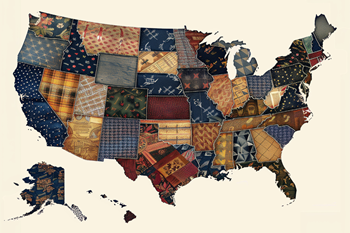<p>By Elizabeth Tansing, Vice President, State Government Relations, FMI, and Peter Matz, Director, Food, Pharmacy & Health Policy, FMI</p><p><img src="https://www.fmi.org/images/default-source/blog-images/patchwork-us-map.tmb-large-350-.png?Culture=en&sfvrsn=db7c186a_1" style="float:right;margin-bottom:10px;margin-left:10px;" class="-align-right" alt="Patchwork US Map" sf-size="1532165" />For the first time in the program’s nearly 90-year history, the United States Department of Agriculture (USDA) has granted a waiver for state-level product restrictions within the Supplemental Nutrition Assistance Program (SNAP), following a <a href="https://www.fns.usda.gov/snap/waivers/foodrestriction/nebraska" target="_blank">request</a> by Nebraska. This has paved the way for others − both Iowa and Indiana have also received USDA approval for their requests. Other states currently have similar waiver requests under USDA review: <a href="https://governor.arkansas.gov/request-for-the-secretary-of-the-u-s-department-of-agriculture-usda-to-pilot-projects-meant-to-improve-nutrition-and-health-under-the-supplemental-nutrition-assistance-program/" target="_blank">Arkansas</a>, <a href="https://www.fmi.org/docs/default-source/state-affairs/supporting-healthier-foods-co-waiver-overview.pdf?sfvrsn=3ecb9884_1" target="_blank">Colorado</a>, <a href="https://healthandwelfare.idaho.gov/news/idaho-submits-waiver-request-exclude-soft-drinks-and-candy-snap-purchases" target="_blank">Idaho</a>, <a href="https://s3.documentcloud.org/documents/25893168/snap-waiver.pdf" target="_blank">Kansas</a>, <a href="https://www.fmi.org/docs/default-source/state-affairs/texas-waiver-request.pdf?sfvrsn=41176795_1//www.fmi.org/docs/default-source/state-affairs/texas-waiver-request.pdf?sfvrsn=41176795_1%3ETexas%20Waiver%20Request%3C/a%3E" target="_blank">Texas</a>, Utah and <a href="https://www.youtube.com/watch?v=2H2uhD-rEtc" target="_blank">West Virginia</a>. We expect more states to follow.<span style="background-color:transparent;color:inherit;font-family:inherit;font-size:inherit;text-align:inherit;text-transform:inherit;word-spacing:normal;caret-color:auto;white-space:inherit;"> </span></p><p>While these state waiver requests reflect the laudable goal of promoting healthier dietary habits, such policy shifts could lead to significant unintended consequences for grocery stores, SNAP participants and all consumers. This is uncharted territory for SNAP and would increase costs, complicate a highly efficient nationwide system shoppers rely on and create a slippery slope of state-by-state variation that undermines the program’s foundation. </p><p>Introducing state-specific rules on eligible SNAP products on top of the existing federal exclusions for alcohol, tobacco, hot prepared foods, and more adds significant complexity to a program long praised for its simplicity and administrative efficiency.<span style="background-color:transparent;color:inherit;font-family:inherit;font-size:inherit;text-align:inherit;text-transform:inherit;word-spacing:normal;caret-color:auto;white-space:inherit;"> </span></p><p>Creating different allowable product lists on a state-by-state basis disrupts this consistent national model – often without clear evidence of improved health outcomes. That’s partly because states only have data on what is purchased with the SNAP EBT card, not on the shopper’s full basket. Many SNAP participants use personal payment methods in addition to SNAP benefits in a single transaction, meaning a shopper’s foods like fruits, vegetables or lean proteins might be paid for with personal cash, debit or credit cards.<span style="background-color:transparent;color:inherit;font-family:inherit;font-size:inherit;text-align:inherit;text-transform:inherit;word-spacing:normal;caret-color:auto;white-space:inherit;"> </span></p><p>A recent <a href="https://www.fmi.org/docs/default-source/facts-about-snap-toolkit/fmi-national-snap-survey_05-07-25.pdf?sfvrsn=edefdedd_1">national survey</a> conducted by FMI and leading pollster Fabrizio, Lee & Associates found that voters, by a 57% to 39% margin, prefer a single federal standard for SNAP over a patchwork of 50 state schemes. Efforts to restrict products at the state level risk diverting attention and resources away from the program’s core mission of combating food insecurity. </p><p>State-specific restrictions also pose major logistical and financial challenges for food retailers, especially those operating in multiple states. With more than 650,000 food and beverage products on the market today and approximately 20,000 new products introduced into the marketplace each year, and the average grocery store stocking 32,000 items, compliance will be costly and challenging.<span style="background-color:transparent;color:inherit;font-family:inherit;font-size:inherit;text-align:inherit;text-transform:inherit;word-spacing:normal;caret-color:auto;white-space:inherit;"> </span></p><p>Differing state-by-state rules will require new compliance programs, staff training, and monthly point-of-sale software updates, as new food products coming into the marketplace will need to be evaluated for compliance. These added burdens could lead to checkout delays, higher costs and customer confusion, especially if SNAP rules differ by the state where a card is issued versus where it is used. Moreover, noncompliance with any state’s rules could jeopardize a store’s ability to participate in SNAP – a high-stakes risk for grocers. That’s why FMI urges policymakers to understand the real-world operational impacts before allowing a fragmented approach to take hold.<span style="background-color:transparent;color:inherit;font-family:inherit;font-size:inherit;text-align:inherit;text-transform:inherit;word-spacing:normal;caret-color:auto;white-space:inherit;"> </span></p><p>As noted by former USDA officials during the first Trump administration, including former USDA Secretary Sonny Perdue, imposing item-specific restrictions on SNAP purchases would increase administrative costs significantly, reduce program efficiency and undermine SNAP’s strong track record as one of the most cost-effective federal assistance programs. </p><p>Additionally, the rationale for these restrictions is not well-supported. Recent data from Circana shows that – contrary to a common misperception – SNAP participants shop much like everyone else – with only a three-percentage point difference in purchasing patterns from non-SNAP households. In fact, SNAP shoppers actually purchase a higher share of fresh items in many cases. SNAP participation is also associated with <a href="https://jamanetwork.com/journals/jamainternalmedicine/fullarticle/2653910" target="_blank">better health outcomes</a>, including $1,400 (or nearly 25%) lower annual medical costs for low-income SNAP participants compared to their non-SNAP participating peers. </p><p>Rather than restricting SNAP purchases, FMI supports incentive-based strategies that encourage healthier eating habits while preserving choice and flexibility. Proven initiatives like Double Up Food Bucks and SNAP-Ed expand access to nutritious foods without limiting options or overburdening retailers. </p><p>If nothing else, policymakers should keep this in mind: this is not an approach that voters want. Americans prefer a single set of national rules for SNAP.<span style="background-color:transparent;color:inherit;font-family:inherit;font-size:inherit;text-align:inherit;text-transform:inherit;word-spacing:normal;caret-color:auto;white-space:inherit;"> </span></p><p>FMI remains committed to working with Secretary Rollins, USDA, and state governments to ensure that SNAP remains effective, efficient and responsive to the needs of families across the country – without introducing costly, confusing and unproven new barriers at the checkout line.</p>
[#item_full_content]






